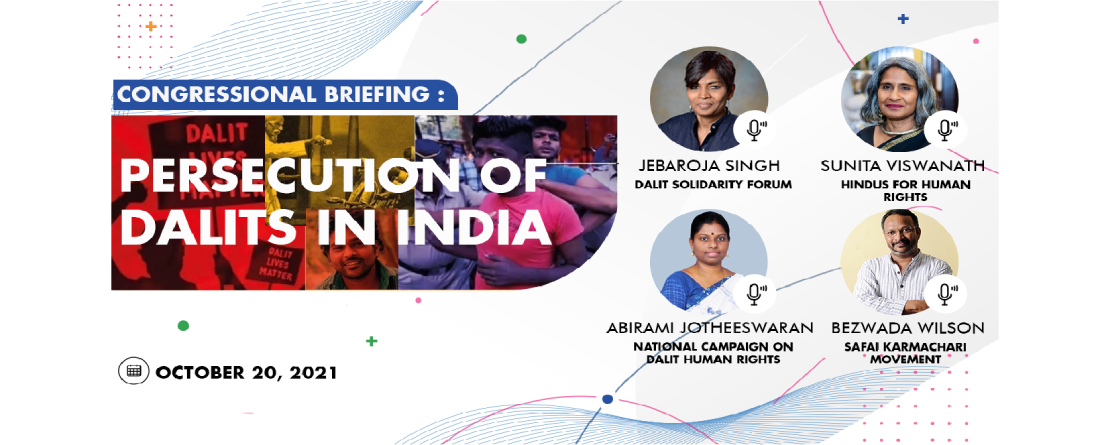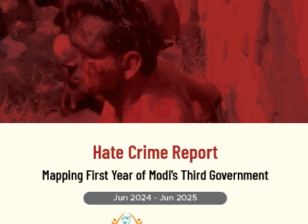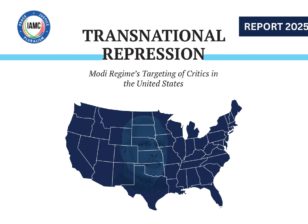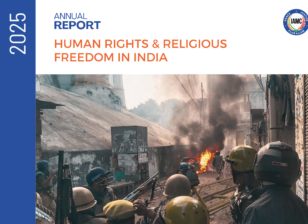Panelists At Congressional Briefing Highlight the Ongoing Denial of Caste Discrimination in Modern India
FOR IMMEDIATE RELEASE
WASHINGTON, D.C., (October 22, 2021) – Millions of Dalits in India are suffering widespread persecution with governments not only failing to protect them but actively collaborating in their persecution and exploitation, leading civil rights experts said at a Congressional Briefing here this week.
The Dalits, who are socially condemned to the lowest rung of the rigidly hierarchical Hindu society, are increasingly facing hostility and rejection from the government and its agencies, including the criminal justice system, the district, state and federal administration, and even the lawmakers, panelists said at the Briefing.
Calling the caste system the world’s “most irrational practice of social hierarchy,” Jebaroja Singh, President of Dalit Solidarity Forum said, “Dalits have always been marginalized, treated as the different ‘other,’ who deserve no opportunities, no privileges, no place in society, and [no] basic human rights.
“That train of thought continues today…. The more Dalits are speaking up and fighting for their rights, the more the backlash [at them] today.”
Joining the Briefing from New Delhi, India’s capital, Abirami Jotheeswaran, General Secretary of the All India Dalit Mahila Adhikar Manch, said the rate of violence against Dalit women remains alarmingly high. “When we speak about Dalit women, it is not just patriarchy [they face], it is Brahminical patriarchy,” Jotheeswaran said. “The manifestation of the patriarchy is based on caste. Every day, more than nine Dalit women are raped.”
The average conviction rate for all offenses from 2014 to 2020 — including rape, kidnapping, assault, and attempt to rape — was less than 29 percent, she added.
Bezwada Wilson, co-founder of the National Convenor of the Safai Karmachari Andolan (SKA), an Indian human rights organization that campaigns against manual scavenging, pointed out the reluctance of general Indian society to discuss or even accept the reality of ongoing casteism.
“It is so sad to say that we live together, and we say that [India] is fraternity, liberty, freedom – such big words in our constitution,” he said. “But when it comes to our life… the treatment that we [Dalits] recieve is so cruel.”
Despite the high rates of violence against Dalit communities, recieving justice remains difficult due to structural ineqaulities within the judicial system.
“In the higher judiciary, the benches are mostly represented by upper-caste judges,” stated Neil Modi, Assistant Professor at the O.P. Jindal Global University and an affiliate faculty at the Harvard Law School Center on the Legal Profession. In the seven decades since India became a free country, “there continues to be no public data on judges from the Dalit community in different courts.”
“The representation of Dalits in legal professions and higher judiciary is dismal,” said Anurag Bhashkar, a lawyer & SJD Candidate at Georgetown University Law Center, USA. “Unlike other public sectors, where we have affirmative action for Dalits, in higher judiciary we do not have that representation. Without [Dalits and minorities] expressing their belief or trust in these institutions, the institutions cannot be considered credible.”
Sunita Viswanath, Executive Director of Hindus for Human Rights, pointed out that Dalit Muslims and Christians are “still barred from accessing affirmative action benefits” that are available to Dalit Hindus, Sikhs, and Buddhists.
“This is a major religious freedom issue. Millions of people in India are unable to freely change their religious identity because they will lose access to crucial affirmative action policies,” she said. “We are talking about a sixth of India’s population. This is more than the population of most countries… The United States wants to see a thriving India. But India cannot thrive unless Dalits are thriving.”
The briefing was co-hosted by 16 organizations, including Amnesty International USA, 21Wilberforce, Hindus for Human Rights, Indian American Muslim Council, International Christian Concern, Jubilee Campaign, Dalit Solidarity Forum, New York State Council of Churches, Federation of Indian American Christian Organizations of North America, India Civil Watch International, Students Against Hindutva Ideology, Center for Pluralism, American Muslim Institution, International Society for Peace and Justice, Association of Indian Muslims of America, and the Humanism Project (Australia).




